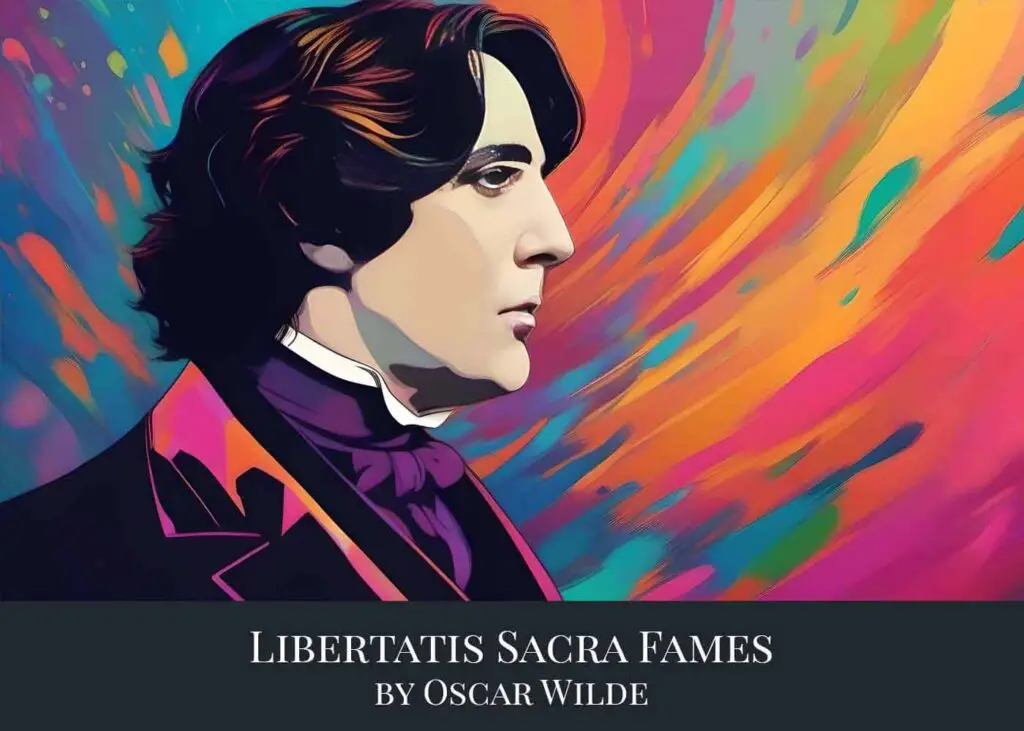
Libertatis Sacra Fames by Oscar Wilde
“Libertatis Sacra Fames” is a Latin phrase that translates to “The Sacred Hunger for Freedom.” The poem by Irish playwright and poet Oscar Wilde, found in his collection Poems, touches on the deeply rooted human yearning for liberty. You can explore a digital collection of Oscar Wilde’s Poems by visiting PageVio.
1. The Poem
Albeit nurtured in democracy,
And liking best that state republican
Where every man is Kinglike and no man
Is crowned above his fellows, yet I see,
Spite of this modern fret for Liberty,
Better the rule of One, whom all obey,
Than to let clamorous demagogues betray
Our freedom with the kiss of anarchy.
Wherefore I love them not whose hands profane
Plant the red flag upon the piled-up street
For no right cause, beneath whose ignorant reign
Arts, Culture, Reverence, Honour, all things fade,
Save Treason and the dagger of her trade,
Or Murder with his silent bloody feet.
Download Libertatis Sacra Fames Poster
Size: 8″ x 12″ (2:3 ratio)
Format: PDF
Note: Actual poster background color is white. For the sample poster, the background is made gray for illustration purpose.
2. Libertatis Sacra Fames Analysis
This poem grapples with the tension between democracy and monarchy, freedom and order. Let’s break it down, line by line:
“Albeit nurtured in democracy, / And liking best that state republican”
The speaker acknowledges being raised in a democratic environment and having a preference for a republican state, which emphasizes the role of citizens in governance and opposes the idea of a monarchy.
“Where every man is Kinglike and no man / Is crowned above his fellows,”
In an ideal democratic or republican system, every individual has equal rights and there’s no single ruler or monarch who stands above the rest.
“Spite of this modern fret for Liberty, / Better the rule of One, whom all obey,”
Despite the contemporary clamor and insistence on liberty, the speaker suggests there may be value in the rule of a single individual whom everyone obeys, hinting at a monarch or a strong centralized leader.
“Than to let clamorous demagogues betray / Our freedom with the kiss of anarchy.”
The speaker voices concern about “demagogues” – leaders who appeal to popular desires and prejudices rather than using rational arguments. These leaders, in the speaker’s view, could lead society towards anarchy, even while promising freedom.
“Wherefore I love them not whose hands profane / Plant the red flag upon the piled-up street”
The speaker expresses disdain for those who casually champion revolutionary symbols (like the “red flag”) without understanding the deeper implications. This could allude to superficial or misguided revolutionaries.
“For no right cause, beneath whose ignorant reign / Arts, Culture, Reverence, Honour, all things fade,”
Under the rule of these misguided leaders, important aspects of society such as the arts, culture, reverence, and honor deteriorate.
“Save Treason and the dagger of her trade, / Or Murder with his silent bloody feet.”
The only things that flourish under such leadership, according to the speaker, are treason, violence, and murder.
In summary, the poem articulates a skepticism towards unchecked democratic fervor, especially when it’s championed by demagogues or when it veers towards anarchy. It stresses the importance of a balanced approach to governance, suggesting that sometimes a single, wise ruler might be preferable to the chaos of misguided popular rule. The speaker warns of the dangers of superficial revolutionary ideals that can erode culture, reverence, and honor.
3. Conclusion
If “Libertatis Sacra Fames” and its passionate plea for true liberty have moved you, consider exploring our collection of Oscar Wilde’s poetry for more thought-provoking works.